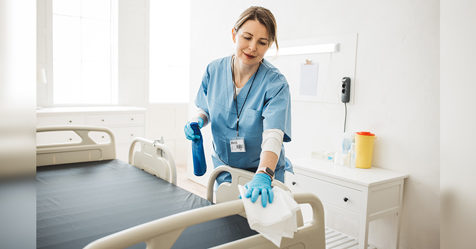Many associate norovirus with the “cruise ship” virus because the news often features stories about ships having to dock early due to an outbreak.
In fact, the Centers for Disease Control and Prevention (CDC)report that one in 10 passengers between 2008 and 2014 fell victim to this virus. However, despite what the media reports may lead you to believe, norovirus isn’t limited to cruise ships.
Because you can contract norovirus from an infected person, from contaminated food or water, or by touching a contaminated surface, it is highly contagious, especially among children and young adults in day cares, schools, and hostels/dormitories. Once infected, norovirus can cause severe vomiting and diarrhea in its victims. Norovirus can tear through a crowd of any size.
At the upcoming ISSA Show North America in Las Vegas, IEHA will focus more on infection control, and how to resolve it if our establishment is plagued with any virus that is common within our industries.
Cleaning professionals are often on the front lines when it comes to battling outbreaks such as norovirus. By understanding both the virus and basic principles of microbiology, we can effectively limit the impact of an outbreak within our facility.
When norovirus strikes
According to the C DC, norovirus is sometimes called the “stomach flu” or “stomach bug,” but it is not related to the flu, which is caused by the influenza virus. A person will typically develop symptoms anywhere from 12 to 48 hours after exposure, which can last for approximately one to three days.
Whenever it is determined that the virus is present in the body, treatment should be administered immediately. Drink lots of fluids to prevent dehydration and take steps to keep it from spreading.
According to the CDC, the virus occurs most often from November to April. Every year more than 20 million people in the United States fall victim to norovirus.
Norovirus is considered to be a foodborne illness because the virus can easily contaminate food and water sources. It is highly recommended that those who work/handle food wear proper personal protective equipment (PPE), such as gloves, to prevent cross contamination.
Here are five tips to weaponize your environmental/cleaning services team should this occur in your facility:
- Identify a plan of attack: Develop a list of hard surface areas within the building, and another list of fomites, or frequently touched surface areas (light switches, door handles).
- Protect your team: Make sure cleaning workers have full PPE, including gloves and masks to avoid contamination.
- Clean and disinfect all hard surfaces: Using an EPA-registered disinfectant and increase cleaning frequencies for fomites. This should include all inanimate objects within the building, both personal and public items.
- Be diligent about hand hygiene: This is very important before you eat, prepare food, and after you use the restroom. Some experts have said to wash hands thoroughly for at least 20 seconds or use the old method of singing the “Happy Birthday” song twice.
- Encourage sick employees to stay home: Norovirus spreads easily, so take care that you don’t end up without any cleaning workers. Encourage staff to stay at home if they experience any symptoms associated with the virus.
If you experience norovirus, here are a few things to keep in mind:
- Wash your hands thoroughly with soap and water: This is very important before you eat, prepare food, and after you use the restroom. It is critical to continue washing your hands thoroughly and often to avoid spreading the virus.
- Clean, clean, rinse, rinse: Making sure that you clean after having liquid diarrhea or vomiting will help in the prevention of spreading the germs, as well as cleaning and rinsing fruits and vegetables before preparing or eating them.
- Remove and wash clothes: Make sure that soiled linens, clothing, towels, and any other items that the infected person has come in contact with, are properly laundered using the facilities approved detergent, and for the maximum cycle length and tumble dry.
- Care and food preparation: Do not prepare food or care for others while you still have symptoms, especially for those working in the health care facilities, schools, or day cares. It is recommended that an infected person should wait two to three days after they are symptom-free before they prepare food or care for others.
- Don’t share: If the person that is affected shares items, such as an ordinary television remote control, they can cause others to become sick. It is very important to stay away from your family when the symptoms are still active, otherwise others will be affected.
The key to preventing the spread of norovirus is to stop it from the start. By being diligent and implementing an aggressive cleaning and disinfection plan, you can help protect yourself and others in your building.




